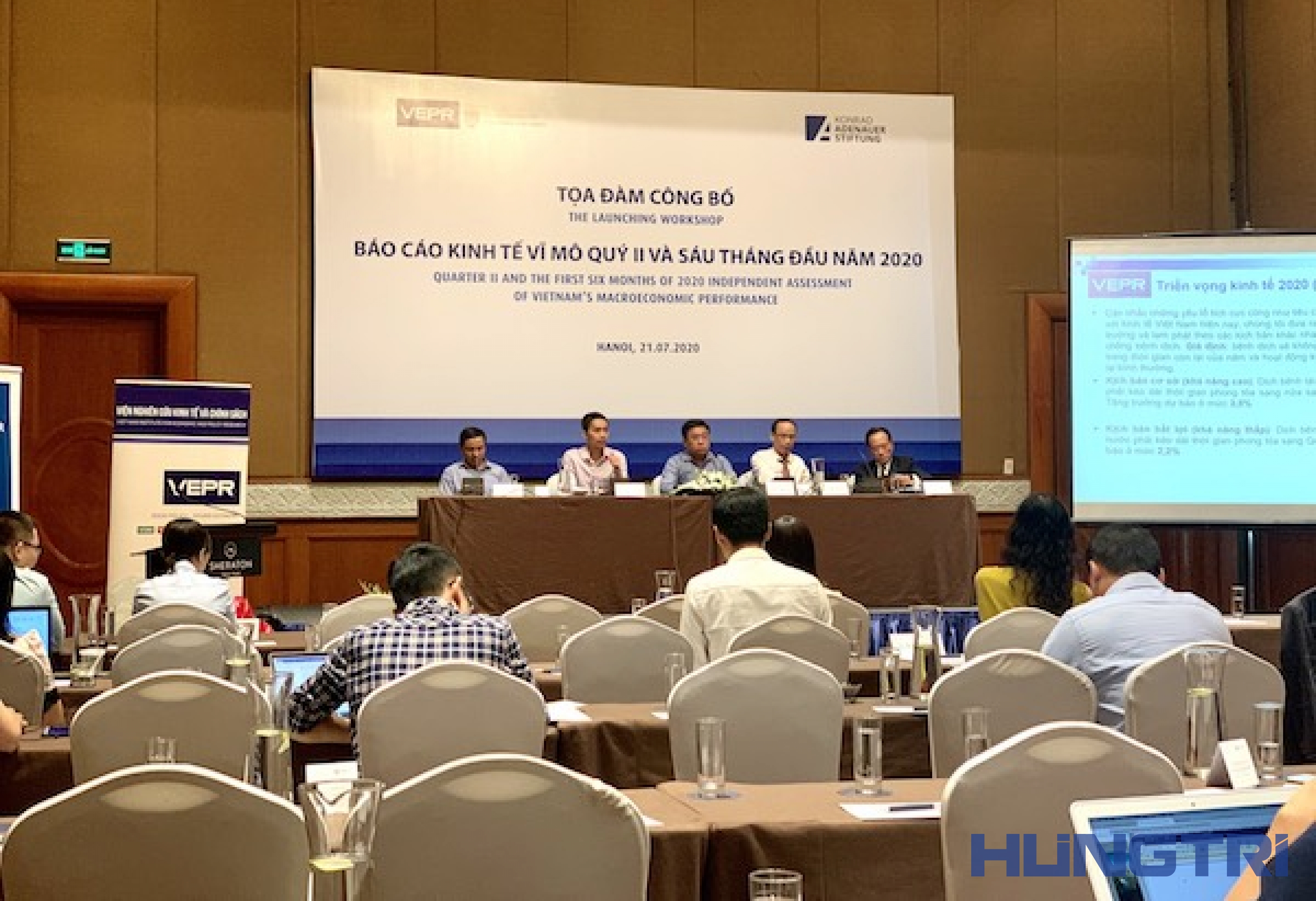Kinhtedothi - VEPR predicts that there will be two scenarios for Vietnam's economic growth in 2020, in which the high possibility is that this year's economic growth will reach 3.8%. The lower possibility is that the economy can grow 2.2%, while the optimistic scenario of 5% is determined to be difficult to achieve.
On the morning of July 21, the seminar on announcing the macroeconomic report for the second quarter and the first 6 months of 2020, organized by the Vietnam Institute for Economic and Policy Research (VEPR), took place in Hanoi.
Identify the positive and negative aspects:
Presenting the report, Associate Professor Dr. Pham The Anh - Chief Economist of VEPR said that, in the face of the serious impact of Covid-19 on the global economy, Vietnam is one of the few countries in the world with positive economic growth in the second quarter of 2020, reaching 0.36%. In the first 6 months of the year, GDP increased by 1.81%.
In the context of general difficulties, the sector considered to be the bright spot that helped Vietnam's 6-month growth rate of 1.81% is agriculture. The agricultural sector has become the bright spot of growth in the past 6 months, contributing to the overall growth rate of 12%, double the same period last year.
The second-largest contributor was manufacturing, which contributed about 5% to overall growth, partly due to public investment and construction activities continuing during social distancing.
Also in the first 6 months of the year, the number of newly registered enterprises decreased by 7.3%, the total newly registered capital decreased by 19% and the total number of registered employees decreased by 21.8% compared to the first 6 months of 2019. The number of enterprises temporarily suspending business for a period of time increased by 38.2% compared to the same period last year...
In that context, VEPR experts said that Vietnam's economic prospects in 2020 depend on the ability to control the epidemic, not only domestically but also globally.
Factors that could support growth in the rest of the year include expectations for economic prospects brought about by the completion of the signing of the Free Trade Agreement and Investment Protection Agreement between Vietnam and the EU (EVFTA and IPA); The disbursement and construction progress of key public investment projects is accelerated as expected; The cost of raw materials remains low due to the decline in consumption and production demand; The wave of investment shift to disperse risks from the US-China trade war and take advantage of investment incentives in Vietnam; A stable macro environment, inflation controlled at an average level, creating favorable conditions for implementing growth support policies.
However, Vietnam is also facing many risks and challenges in an unstable global economic environment and uncertain future. The resurgence of Covid-19 in many countries, coupled with lockdown measures, has prolonged the disruption of supply chains; geopolitical conflicts between major countries can cause a highly open economy like Vietnam to face unexpected risks.
In addition, the weaknesses of Vietnam's economy also come from internal risks such as large fiscal imbalances, the slowing down of investment and development, especially infrastructure; the health of the banking and financial system, although gradually consolidated, is still vulnerable; heavy dependence of growth on the FDI sector and lack of autonomy in technology and raw materials; low labor quality; low efficiency of public investment and heavy corruption of the public apparatus; the stalled equitization process of state-owned enterprises, and low-quality business environment and institutions.
Two growth scenarios:
Considering the positive and negative factors currently affecting Vietnam's economy, VEPR has forecasted growth and inflation under different scenarios of the pandemic prevention situation. Accordingly, the economy is likely to achieve a growth rate of 3.8% for the whole year of 2020. In a lower possibility, the economy may only grow by 2.2% due to the unfavorable developments of Covid-19.
Specifically, with the Baseline Scenario (high probability): In this scenario, the epidemic will not recur domestically for the remainder of the year, and domestic economic activities will gradually return to normal. However, the Covid-19 epidemic in many important economic and financial centers in the world is assumed to have the potential to re-emerge, or lack of confidence, causing countries to extend the lockdown period to the second half of the third quarter of 2020, affecting the demand for imported goods from Vietnam and the demand for tourism and accommodation in Vietnam.
Accordingly, the impact of Covid-19 on the agriculture, forestry and fishery, manufacturing and processing industries and industries in the service sector will be more severe. Economic growth for the whole year is forecast at 3.8%. In general, growth in industries will be modest, in which the most affected industries include accommodation and food services, mining and real estate.

